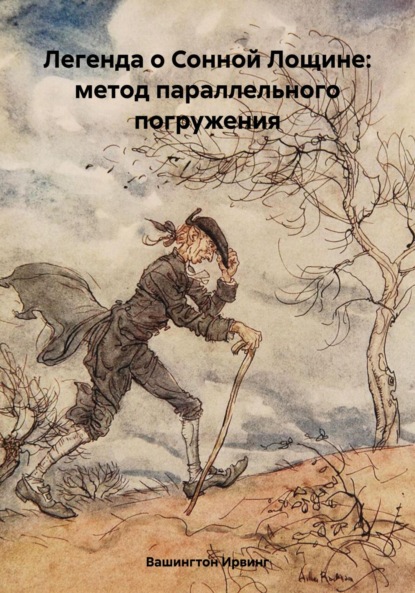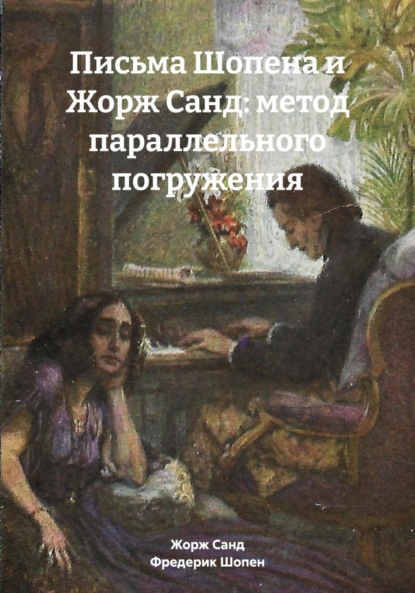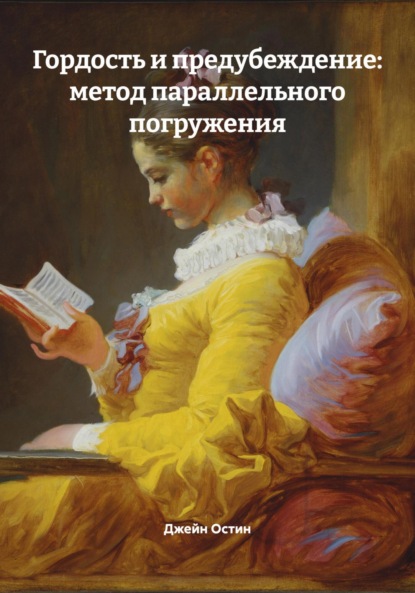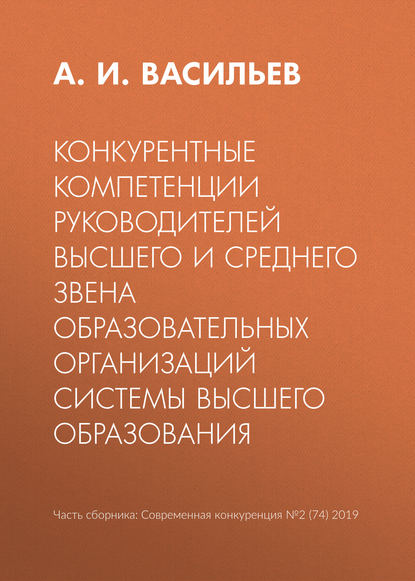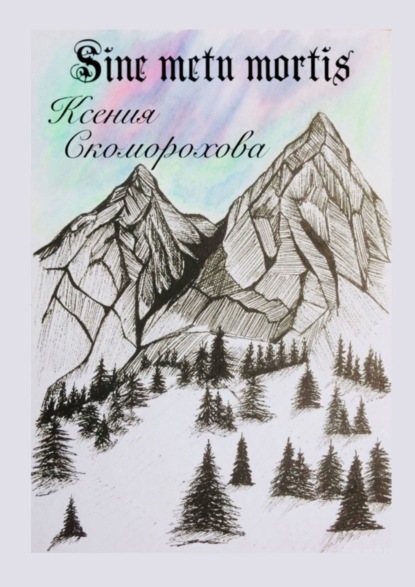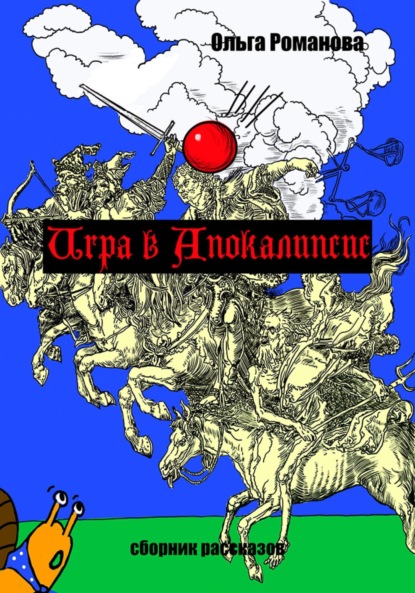Дуэль: метод параллельного погружения
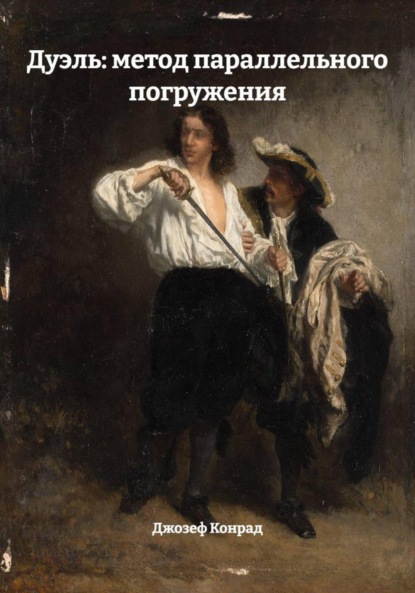
- -
- 100%
- +

I
Napoleon I., (Наполеон I) whose career had the quality of a duel against the whole of Europe, (чья карьера имела характер поединка против всей Европы; career – карьера; duel – поединок; quality – черта, характер) disliked duelling between the officers of his army. (не любил поединки между офицерами своей армии; dislike – не любить; duelling – поединки; officers – офицеры; army – армия) The great military emperor (великий военный император; military – военный; emperor – император) was not a swashbuckler, (не был задирой, фехтовальщиком; swashbuckler – задира, дуэлянт) and had little respect for tradition. (и питал мало уважения к традиции; respect – уважение; tradition – традиция)
I
Napoleon I., whose career had the quality of a duel against the whole of Europe, disliked duelling between the officers of his army. The great military emperor was not a swashbuckler, and had little respect for tradition.
Nevertheless, (Тем не менее; nevertheless – тем не менее) a story of duelling, which became a legend in the army, (история о поединке, которая стала легендой в армии; duelling – поединок; legend – легенда; army – армия) runs through the epic of imperial wars. (проходит сквозь эпос имперских войн; run through – проходить через; epic – эпос; imperial – имперский) To the surprise and admiration of their fellows, (к удивлению и восхищению их товарищей; surprise – удивление; admiration – восхищение; fellows – товарищи) two officers, like insane artists trying to gild refined gold or paint the lily, (два офицера, подобно безумным художникам, пытавшимся позолотить очищенное золото или раскрасить лилию; insane – безумный; gild – позолотить; refined – очищенный; paint the lily – украшать совершенство) pursued a private contest through the years of universal carnage. (вели личное состязание сквозь годы всеобщего кровопролития; pursue – преследовать, вести; contest – состязание; carnage – кровопролитие) They were officers of cavalry, (они были офицерами кавалерии; cavalry – кавалерия) and their connection with the high-spirited but fanciful animal which carries men into battle (и их связь с живым, но капризным животным, которое несёт людей в бой; high-spirited – живой, энергичный; fanciful – капризный, причудливый; carry into battle – нести в бой) seems particularly appropriate. (кажется особенно уместной; appropriate – уместный) It would be difficult to imagine for heroes of this legend (трудно было бы представить героями этой легенды; difficult – трудный; imagine – вообразить; heroes – герои; legend – легенда) two officers of infantry of the line, for example, (двух офицеров линейной пехоты, например; infantry – пехота; line – линия, линейный; for example – например) whose fantasy is tamed by much walking exercise, (чьё воображение усмирено множеством пеших упражнений; fantasy – воображение; tame – укрощать; walking exercise – пешие упражнения) and whose valour necessarily must be of a more plodding kind. (и чья храбрость, по необходимости, должна быть более усердного, приземлённого характера; valour – храбрость; plodding – усердный, монотонный) As to gunners or engineers, (что касается артиллеристов или инженеров; gunner – артиллерист; engineer – инженер) whose heads are kept cool on a diet of mathematics, (чьи головы остаются холодными благодаря математической пище; diet – рацион, питание; mathematics – математика) it is simply unthinkable. (это просто немыслимо; unthinkable – немыслимый)
Nevertheless, a story of duelling, which became a legend in the army, runs through the epic of imperial wars. To the surprise and admiration of their fellows, two officers, like insane artists trying to gild refined gold or paint the lily, pursued a private contest through the years of universal carnage. They were officers of cavalry, and their connection with the high-spirited but fanciful animal which carries men into battle seems particularly appropriate. It would be difficult to imagine for heroes of this legend two officers of infantry of the line, for example, whose fantasy is tamed by much walking exercise, and whose valour necessarily must be of a more plodding kind. As to gunners or engineers, whose heads are kept cool on a diet of mathematics, it is simply unthinkable.
The names of the two officers were Feraud and D’Hubert, (Имена двух офицеров были Феро и Д’Юбер; names – имена; officer – офицер) and they were both lieutenants in a regiment of hussars, (и оба они были лейтенантами в полку гусар; lieutenant – лейтенант; regiment – полк; hussar – гусар) but not in the same regiment. (но не в одном и том же полку; same – тот же самый)
The names of the two officers were Feraud and D’Hubert, and they were both lieutenants in a regiment of hussars, but not in the same regiment.
Feraud was doing regimental work, (Феро выполнял полковую работу; regimental – полковой; work – работа) but Lieut. D’Hubert had the good fortune (но лейтенант Д’Юбер имел счастье; good fortune – удача, везение) to be attached to the person of the general commanding the division, (быть прикреплённым к особе генерала, командующего дивизией; attached to – прикреплён к; commanding – командующий; division – дивизия) as officier d’ordonnance. (в качестве ординарца, адъютанта; officier d’ordonnance – ординарец) It was in Strasbourg, (Это было в Страсбурге; Strasbourg – Страсбург) and in this agreeable and important garrison (и в этом приятном и важном гарнизоне; agreeable – приятный; important – важный; garrison – гарнизон) they were enjoying greatly a short interval of peace. (они с большим удовольствием наслаждались коротким промежутком мира; enjoy greatly – сильно наслаждаться; interval – промежуток; peace – мир) They were enjoying it, though both intensely warlike, (Они наслаждались им, хотя оба были крайне воинственны; intensely – крайне; warlike – воинственный) because it was a sword-sharpening, firelock-cleaning peace, (потому что это был мир точения сабель и чистки ружей; sword-sharpening – точение мечей; firelock – кремнёвое ружьё; cleaning – чистка) dear to a military heart and undamaging to military prestige, (дорогой военному сердцу и не наносящий вреда военному престижу; dear to – дорогой; prestige – престиж) inasmuch that no one believed in its sincerity or duration. (так как никто не верил ни в его искренность, ни в его продолжительность; inasmuch that – поскольку; sincerity – искренность; duration – продолжительность)
Feraud was doing regimental work, but Lieut. D’Hubert had the good fortune to be attached to the person of the general commanding the division, as officier d’ordonnance. It was in Strasbourg, and in this agreeable and important garrison they were enjoying greatly a short interval of peace. They were enjoying it, though both intensely warlike, because it was a sword-sharpening, firelock-cleaning peace, dear to a military heart and undamaging to military prestige, inasmuch that no one believed in its sincerity or duration.
Under those historical circumstances, (При тех исторических обстоятельствах; circumstance – обстоятельство) so favourable to the proper appreciation of military leisure, (таких благоприятных для должного наслаждения военным досугом; favourable – благоприятный; appreciation – оценка, наслаждение; leisure – досуг) Lieut. D’Hubert, one fine afternoon, (лейтенант Д’Юбер, в один прекрасный день; fine – прекрасный, ясный; afternoon – день, после полудня) made his way along a quiet street of a cheerful suburb (направился по тихой улице весёлого пригорода; make one’s way – направляться; quiet – тихий; suburb – пригород; cheerful – оживлённый, приятный) towards Lieut. Feraud’s quarters, (по направлению к квартире лейтенанта Феро; towards – к, по направлению; quarters – жильё, квартира (военная)) which were in a private house with a garden at the back, (которая находилась в частном доме с садом позади; private house – частный дом; garden – сад; at the back – сзади, позади) belonging to an old maiden lady. (принадлежавшем пожилой незамужней даме; belonging to – принадлежащий; maiden lady – старая дева, незамужняя женщина)
Under those historical circumstances, so favourable to the proper appreciation of military leisure, Lieut. D’Hubert, one fine afternoon, made his way along a quiet street of a cheerful suburb towards Lieut. Feraud’s quarters, which were in a private house with a garden at the back, belonging to an old maiden lady.
His knock at the door was answered instantly by a young maid in Alsatian costume. (На его стук в дверь сразу ответила молодая служанка в эльзасском костюме; knock – стук; instantly – сразу; maid – служанка; Alsatian costume – эльзасский костюм) Her fresh complexion and her long eyelashes, (её свежий цвет лица и длинные ресницы; complexion – цвет лица; eyelash – ресница) lowered demurely at the sight of the tall officer, (скромно опущенные при виде высокого офицера; lower demurely – опустить скромно, застенчиво; at the sight of – при виде) caused Lieut. D’Hubert, who was accessible to esthetic impressions, (заставили лейтенанта Д’Юбера, который был восприимчив к эстетическим впечатлениям; accessible – восприимчивый; esthetic impression – эстетическое впечатление) to relax the cold, severe gravity of his face. (смягчить холодную, суровую серьёзность своего лица; relax – ослабить, смягчить; severe – строгий, суровый; gravity – серьёзность) At the same time he observed (в то же время он заметил; observe – заметить, наблюдать) that the girl had over her arm a pair of hussar’s breeches, blue with a red stripe. (что у девушки на руке висели гусарские брюки – синие, с красной полосой; breeches – брюки; stripe – полоса)
His knock at the door was answered instantly by a young maid in Alsatian costume. Her fresh complexion and her long eyelashes, lowered demurely at the sight of the tall officer, caused Lieut. D’Hubert, who was accessible to esthetic impressions, to relax the cold, severe gravity of his face. At the same time he observed that the girl had over her arm a pair of hussar’s breeches, blue with a red stripe.
“Lieut. Feraud in?” he inquired, benevolently. («Лейтенант Феро дома?» – спросил он благожелательно; inquire – спрашивать; benevolently – благожелательно, доброжелательно)
“Oh, no, sir! He went out at six this morning.” («О нет, сэр! Он ушёл в шесть утра»; went out – вышел, ушёл; this morning – этим утром)
The pretty maid tried to close the door. (Милая служанка попыталась закрыть дверь; pretty – милая; try to – попытаться) Lieut. D’Hubert, opposing this move with gentle firmness, (лейтенант Д’Юбер, воспротивившись этому движению с мягкой решительностью; oppose – противостоять; gentle firmness – мягкая твёрдость) stepped into the ante-room, jingling his spurs. (вошёл в переднюю, позвякивая шпорами; ante-room – передняя, прихожая; jingle – звенеть; spur – шпора)
“Come, my dear! You don’t mean to say he has not been home since six o’clock this morning?” («Ну же, дорогая! Неужели ты хочешь сказать, что он не был дома с шести часов утра?»; mean to say – хочешь сказать; since – с тех пор как; o’clock – час)
“Lieut. Feraud in?” he inquired, benevolently.
“Oh, no, sir! He went out at six this morning.”
The pretty maid tried to close the door. Lieut. D’Hubert, opposing this move with gentle firmness, stepped into the ante-room, jingling his spurs.
“Come, my dear! You don’t mean to say he has not been home since six o’clock this morning?”
Saying these words, Lieut. D’Hubert opened without ceremony the door of a room (Произнося эти слова, лейтенант Д’Юбер без церемоний открыл дверь комнаты; without ceremony – без церемоний; open – открыть) so comfortably and neatly ordered (так уютно и аккуратно обставленной; comfortably – уютно; neatly – аккуратно; order – приводить в порядок) that only from internal evidence in the shape of boots, uniforms, and military accoutrements (что лишь по внутренним признакам – сапогам, мундирам и военному снаряжению; internal evidence – внутренние признаки; in the shape of – в виде; accoutrement – снаряжение) did he acquire the conviction that it was Lieut. Feraud’s room. (он убедился, что это была комната лейтенанта Феро; acquire – получить, обрести; conviction – убеждение) And he saw also that Lieut. Feraud was not at home. (И он также увидел, что лейтенанта Феро не было дома; at home – дома) The truthful maid had followed him, (Правдивая служанка последовала за ним; truthful – правдивая, искренняя; follow – следовать) and raised her candid eyes to his face. (и подняла свои чистые, откровенные глаза на его лицо; candid – откровенный, чистосердечный)
Saying these words, Lieut. D’Hubert opened without ceremony the door of a room so comfortably and neatly ordered that only from internal evidence in the shape of boots, uniforms, and military accoutrements did he acquire the conviction that it was Lieut. Feraud’s room. And he saw also that Lieut. Feraud was not at home. The truthful maid had followed him, and raised her candid eyes to his face.
“H’m!” said Lieut. D’Hubert, («Хм!» – сказал лейтенант Д’Юбер; said – сказал) greatly disappointed, (сильно разочарованный; greatly – сильно; disappointed – разочарованный) for he had already visited all the haunts (потому что он уже побывал во всех излюбленных местах; haunt – излюбленное место, прибежище) where a lieutenant of hussars could be found of a fine afternoon. (где можно было найти лейтенанта-гусара в ясный день; could be found – можно было найти; fine afternoon – прекрасный день) “So he’s out?” («Значит, он не дома?»; out – не дома, снаружи) “And do you happen to know, my dear, («И ты, дорогая, случайно не знаешь; happen to know – случайно знать) why he went out at six this morning?” (почему он ушёл в шесть утра?; went out – вышел, ушёл; this morning – этим утром)
“H’m!” said Lieut. D’Hubert, greatly disappointed, for he had already visited all the haunts where a lieutenant of hussars could be found of a fine afternoon. “So he’s out? And do you happen to know, my dear, why he went out at six this morning?”
“No,” she answered, readily. («Нет», – ответила она живо; readily – охотно, живо) “He came home late last night, and snored.” («Он вернулся домой поздно вчера вечером и храпел»; came home – вернулся домой; snore – храпеть) “I heard him when I got up at five.” («Я слышала его, когда встала в пять»; heard – слышала; got up – встала) “Then he dressed himself in his oldest uniform and went out.” («Потом он надел свой самый старый мундир и ушёл»; dress oneself – одеваться; uniform – мундир; went out – ушёл) “Service, I suppose.” («Служба, полагаю»; suppose – полагать)
“Service? Not a bit of it!” cried Lieut. D’Hubert. («Служба? Ничуть не бывало!» – воскликнул лейтенант Д’Юбер; not a bit of it – вовсе нет) “Learn, my angel, («Знай, мой ангел; learn – знай, учти) that he went out thus early to fight a duel with a civilian.” (что он ушёл так рано, чтобы драться на дуэли с гражданским; fight a duel – драться на дуэли; civilian – гражданский)
“No,” she answered, readily. “He came home late last night, and snored. I heard him when I got up at five. Then he dressed himself in his oldest uniform and went out. Service, I suppose.”
“Service? Not a bit of it!” cried Lieut. D’Hubert. “Learn, my angel, that he went out thus early to fight a duel with a civilian.”
She heard this news without a quiver of her dark eyelashes. (Она выслушала эту новость без малейшего дрожания своих тёмных ресниц; quiver – дрожание, трепет; eyelash – ресница) It was very obvious (Было совершенно очевидно; obvious – очевидный) that the actions of Lieut. Feraud were generally above criticism. (что поступки лейтенанта Феро, в целом, были выше всяких упрёков; action – поступок, действие; above criticism – вне критики, безупречный) She only looked up for a moment in mute surprise, (Она лишь на мгновение подняла глаза в немом удивлении; look up – поднять глаза; mute – немой; surprise – удивление) and Lieut. D’Hubert concluded from this absence of emotion (и лейтенант Д’Юбер сделал вывод из этого отсутствия эмоций; conclude – сделать вывод; absence – отсутствие; emotion – эмоция, чувство) that she must have seen Lieut. Feraud since the morning. (что она, должно быть, видела лейтенанта Феро с утра; must have seen – должно быть, видела; since the morning – с утра) He looked around the room. (Он оглядел комнату; look around – осмотреться)
She heard this news without a quiver of her dark eyelashes. It was very obvious that the actions of Lieut. Feraud were generally above criticism. She only looked up for a moment in mute surprise, and Lieut. D’Hubert concluded from this absence of emotion that she must have seen Lieut. Feraud since the morning. He looked around the room.
“Come!” he insisted, with confidential familiarity. («Ну же!» – настаивал он с доверительной непринуждённостью; insist – настаивать; confidential – доверительный; familiarity – непринуждённость) “He’s perhaps somewhere in the house now?” («Он, может быть, где-то в доме сейчас?»; perhaps – возможно, может быть; somewhere – где-то)
She shook her head. (Она покачала головой; shake one’s head – покачать головой)
“So much the worse for him!” («Тем хуже для него!»; so much the worse – тем хуже) continued Lieut. D’Hubert, in a tone of anxious conviction. (продолжил лейтенант Д’Юбер тоном тревожного убеждения; anxious – тревожный; conviction – убеждённость) “But he has been home this morning.” («Но он ведь был дома сегодня утром»; has been – был; this morning – этим утром)
“Come!” he insisted, with confidential familiarity. “He’s perhaps somewhere in the house now?”
She shook her head.
“So much the worse for him!” continued Lieut. D’Hubert, in a tone of anxious conviction. “But he has been home this morning.”
This time the pretty maid nodded slightly. (На этот раз милая служанка слегка кивнула; nod – кивнуть; slightly – слегка)
“He has!” cried Lieut. D’Hubert. («Был!» – воскликнул лейтенант Д’Юбер; cried – воскликнул) “And went out again? («И снова ушёл?»; went out – вышел, ушёл; again – снова) What for?” («Зачем?»; what for – зачем, с какой целью) “Couldn’t he keep quietly indoors!” («Разве он не мог посидеть спокойно дома!»; keep indoors – оставаться дома; quietly – спокойно) “What a lunatic!” («Какой сумасшедший!»; lunatic – безумец, сумасшедший) “My dear girl—” («Моя дорогая—»; dear – дорогой, милая)
This time the pretty maid nodded slightly.
“He has!” cried Lieut. D’Hubert. “And went out again? What for? Couldn’t he keep quietly indoors! What a lunatic! My dear girl—”
Lieut. D’Hubert’s natural kindness of disposition (Природная доброта лейтенанта Д’Юбера; kindness of disposition – добрый характер) and strong sense of comradeship (и сильное чувство товарищества; sense of comradeship – чувство товарищества) helped his powers of observation. (помогли его наблюдательности; powers of observation – наблюдательность) He changed his tone to a most insinuating softness, (Он изменил тон на чрезвычайно льстивую мягкость; insinuating – вкрадчивый, льстивый; softness – мягкость) and, gazing at the hussar’s breeches hanging over the arm of the girl, (и, глядя на гусарские брюки, висевшие на руке девушки; gaze at – пристально смотреть; breeches – брюки) he appealed to the interest she took in Lieut. Feraud’s comfort and happiness. (он обратился к её заботе о комфорте и счастье лейтенанта Феро; appeal to – обращаться к; comfort – комфорт; happiness – счастье) He was pressing and persuasive. (Он был настойчив и убедителен; pressing – настойчивый; persuasive – убедительный) He used his eyes, which were kind and fine, (Он пользовался своими добрыми, красивыми глазами; fine – благородный, красивый) with excellent effect. (с отличным эффектом; effect – эффект)
Lieut. D’Hubert’s natural kindness of disposition and strong sense of comradeship helped his powers of observation. He changed his tone to a most insinuating softness, and, gazing at the hussar’s breeches hanging over the arm of the girl, he appealed to the interest she took in Lieut. Feraud’s comfort and happiness. He was pressing and persuasive. He used his eyes, which were kind and fine, with excellent effect.
His anxiety to get hold at once of Lieut. Feraud, (Его тревога как можно скорее найти лейтенанта Феро; anxiety – тревога, беспокойство; get hold of – найти, застать) for Lieut. Feraud’s own good, (ради самого Феро; for one’s own good – ради чьего-то блага) seemed so genuine (казалась такой искренней; genuine – искренний, подлинный) that at last it overcame the girl’s unwillingness to speak. (что в конце концов она преодолела нежелание девушки говорить; overcome – преодолеть; unwillingness – нежелание) Unluckily she had not much to tell. (К несчастью, ей было не о чем особенно рассказать; unluckily – к несчастью) Lieut. Feraud had returned home shortly before ten, (лейтенант Феро вернулся домой незадолго до десяти; shortly before – незадолго до) had walked straight into his room, (прошёл прямо в свою комнату; straight into – прямо в) and had thrown himself on his bed to resume his slumbers. (и бросился на кровать, чтобы продолжить сон; throw oneself on – броситься на; resume – возобновить; slumber – сон) She had heard him snore rather louder than before far into the afternoon. (Она слышала, как он храпел громче, чем раньше, далеко за полдень; snore – храпеть; rather louder – несколько громче; far into – далеко за) Then he got up, (Потом он встал; get up – вставать) put on his best uniform, (надел свой лучший мундир; put on – надеть; uniform – мундир) and went out. (и ушёл; went out – вышел, ушёл) That was all she knew. (Это было всё, что она знала; that’s all – вот и всё; know – знать)
